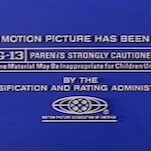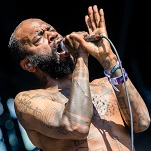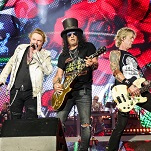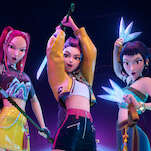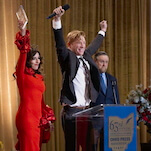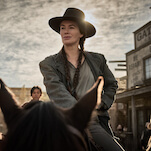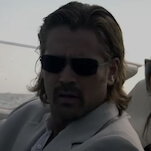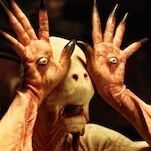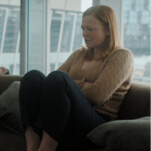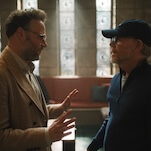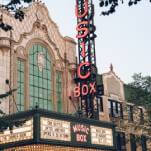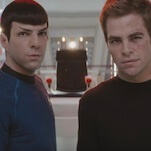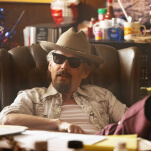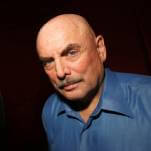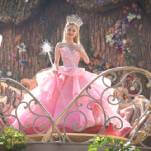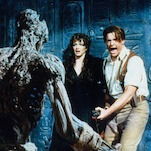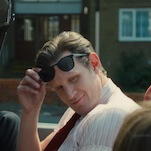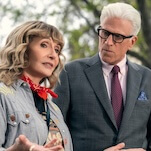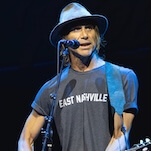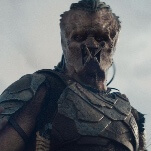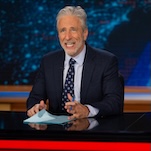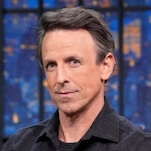Lately, Nas appears to be on a critical and commercial upswing, since he signed with Def Jam and put aside his beef with former Def Jam president Jay-Z to collaborate on standout tracks like "Black Republican." Nas' controversially titled 2006 album Hip Hop Is Dead was a Grammy-winning success that helped instigate a dialogue about the vitality and relevance of hip-hop; Nas subsequently announced plans to title his new album Nigger. The title proved a little too incendiary, and the album is now hitting stores without a name. The A.V. Club recently spoke with the hip-hop legend about the state of hip-hop, regrets, being the subject of dis songs, and navigating major-label politics.
N: Yeah, yeah, but I didn't know what the end result would be, and I feel like a lot of people didn't, including me. I think we'll just have to wait and see.
AVC: Did you worry about potentially limiting the audience for the album, or whether the Wal-Marts of the world would sell it?
N: Yeah, but at the end of the day, I didn't know what was going to happen, so who knows? I didn't know.
AVC: With this and Hip Hop Is Dead, were you concerned that the controversy over the album titles might overshadow the albums themselves?
N: Yeah, but it was more important to me to get those things out there, because the result would be phenomenal. I wanted to get people talking, get people excited, get people angry, get people to prove that hip-hop isn't dead. Or understand some of these hip-hop people's point of views on racial injustice today in 2008.
AVC: With Hip Hop Is Dead, it felt like you were trying to initiate a dialogue about the health and direction of hip-hop. Do you feel like that happened?
N: Totally, man. From Lil' Wayne always mentioning that hip-hop is alive to Ludacris wearin' shirts sayin' "Hip-hop ain't dead, it lives in the South" to Nelly's new video where someone's wearing a shirt that says, "Hip-hop ain't dead." Kanye West mentioned Hip Hop Is Dead at his Grammy speech, so hell yeah.
AVC: There seemed to be a perception in part of the hip-hop community that you were attacking the South. Do you think there's any truth to that?
N: Not at all. Hip-hop is bigger than the South, hip-hop is bigger than New York.
AVC: Do you feel like hip-hop has improved since Hip Hop Is Dead was released?
N: It's going through its rebirth phase. That's what we're watching.
AVC: Do you feel like the provocative titles of these albums put additional pressure on you? You can't put out an album called Hip Hop Is Dead and have it be mediocre.
N: I have to step my own game up. I couldn't really get it off the way I wanted to because of the pressure. I wouldn't admit to the pressure when I was recording it, but it was extreme pressure. I can listen to it now and know that I missed my mark a little on it, in a lot of ways, but that's fine. What needed done was done.
AVC: What do you mean by missing the mark?
N: There were things I could have experimented with, there were topics that I could have played with that could have been more serious.
AVC: Like what?
N: I can't say right now. Just topics.
AVC: A lot of artists on Def Jam have complained about how their albums were promoted. Were you happy with the way Hip Hop Is Dead was marketed?
N: Yeah, because I don't ask for much. Of course I know how it could have sold double what it sold, of course we could go on that forever. No one's promised anything. You could have the biggest record on radio, and sell no records. When people feel like buying it, then they get it. If you're lucky enough to be ahead of the ball, and have your promotion and marketing money happening, happening, happening, and it works, then it works for you, and so God bless. If it doesn't work, it doesn't work, man. It's all music to me, and it is a business, and you want to make sure they put as much as they can behind you. You deserve as much promotion as the other person. But there's so many tricks, man. You're dealing with sharks and gangsters in suits, you know, and you find out Nas' money, the money from Nas' album at one record company is being put into a pop artist because they know what I'm going to sell, so they don't even try to sell anymore. I'm not naming any labels here. I've made records for Interscope, Sony, Def Jam, and I'm not mentioning any labels, but they make decisions behind the scenes when you're not there. If you really want to talk about the business, and how your record didn't work, man, you could go on that for too long. I don't have time for it.
AVC: On Hip Hop Is Dead, you rapped about being the first East Coast rapper that could have signed with Aftermath.
N: Yeah, man, you know, Dre is a guy I felt I could work a lot with. Early on when I was doing the Firm album, I rapped on his first Aftermath album [Dr. Dre Presents… The Aftermath]. The Firm was his second Aftermath release. So I felt like an Aftermath kind of guy. It made me feel like going to Aftermath in the '90s.
AVC: Did Dr. Dre pursue you as a solo artist?
N: I was signed with Columbia Records, so there wasn't much we could do. If we had talked about leaving, it wouldn't have been so easy.
AVC: Were you happy with how The Firm turned out?
N: Yeah, no. I'm happy that it even happened, but there was another direction it could have gone in, if everybody had just got it done.
AVC: People have criticized it for being a little too commercial, a little too oriented toward what was happening in hip-hop at the time. Do you think that's a legitimate criticism?
N: Well basically, it could have gone in a different direction, that's all I got to say about that.
AVC: What was recording "Black Republican" like?
N: [Jay-Z and I] were in the studio, and I had the track, and he started just rapping along to it, so I said "Lay it down, let's do this," and we just did it.
AVC: Did you feel like, because of the history between you and Jay-Z, if you didn't hit it out of the park, people would have been disappointed?
N: Yeah, originally after doing the song, we planned to do more, but time moves fast, and next thing you know, I gotta master an album. [Laughs.]
AVC: What role, if any, did Jay-Z play in getting you signed to Def Jam?
N: I'll tell you what happened. I got a call from someone talking how L.A. Reid was interested in having me come over, so I was like, "Great," After a while he said "Wait," and he remembered Jay's position over there. And he called me back and asked if I was interested in us talking. And I was like "Cool," and he was like "That guy [Jay-Z] said cool, too." So we talked, and basically it was a no-brainer. So what I had to do was convince Sony to go half on the deal, cause I still owed Sony another record. That's how I did it.
[pagebreak]
AVC: Did you feel like signing with Def Jam invigorated your career?
N: Yeah, it was good for it. I think you gotta always do things that keep you excited in an industry that's so bullshit. When you know that you have so much energy and so much to give, it would be a shame if the facilitators of that aren't enthusiastic about you doing it, because you've been doing it for so long. So you just gotta figure out ways in this insane business to keep it fresh, and I thought that was cool as hell.
AVC: You not only starred in your debut movie, Belly, you wrote the story as well.
N: Well, I felt like movies was the next step for me at that time. Something New York-based was important. Still is important, man. There's not enough New York movies out there that touch the real people, so I felt like that's what that was all about.
AVC: Belly director Hype Williams was probably the hottest director in the world at that point.
N: Oh yeah, it was his next thing to do. He had killed the video and turned that into a whole different game. I think people were really excited to see what his movie was going to be like, since his videos were so crazy.
AVC: How much of that film was improvised, and how much of it was scripted?
N: I'd say the majority of it was scripted. Actors, or rappers, or whatever you call 'em, bring their own thing to the table, but it was pretty much scripted.
AVC: There's been talk of a Belly sequel for years, is there any truth to that?
N: Yeah and no. But for the moment, we'll have to wait and see.
AVC: Does acting interest you? Is that something you would like to do more of in the future?
N: I don't know, maybe writing more, maybe directing.
AVC: It seems like KRS-One, who's obviously a big inspiration to you, has set himself up as sort of the conscience of hip-hop. Do you feel like with Hip Hop Is Dead and your new album, you're playing a similar role?
N: Yeah, yeah, he was one of the guys who inspired me, who showed me if I ever got in the rap game, what I should be. How I should stand up and be daring, be brave, you know? So he's a guideline—I guess he was one of the guidelines I used, and Public Enemy, De La Soul, A Tribe Called Quest.
AVC: Do you feel like a hip-hop elder statesman?
N: No, I'm just flowing through, when I see things, I talk about 'em. And it's cool. I don't want any title. I just say what I say, and hopefully somebody gets it, man. I'm not perfect, and I'm just here and trying to make a dollar, and being real at the same time, you know?
AVC: The "Where Are They Now" remixes bring together a lot of older hip-hop artists. How did that come together?
N: I just felt like if I could reach out and find some of these people, how amazing would that be? I always thought about them, some of them only had one record, some of them had somewhat of a career, but either way, their contributions to music is crazy. So I wanted to find out what happened to them, and I did. I wanted to do a show, like a TV show, but things happen, so you just keep moving. But I was very grateful to each one of them for jumping on there; it was an honor for me. Everybody was so excited that we were still getting calls back from people for it even after the song was done. It's been amazing.
AVC: It's unusual in that you don't rap on any of the remixes yourself.
N: I didn't see my place on the record, except for being on the hook, on the chorus. I didn't belong on it, there was just no room for me.
AVC: What rappers give you hope for hip-hop's future?
N: Kanye West, OutKast, The Game, Eminem, Plies, Rick Ross, Young Jeezy.
AVC: You've been very vocal of the state of hip-hop radio; do you think there's any hope for it?
N: I think everything goes in cycles, so it'll come back around. It's no rush at this point. You can't force nothing. Just let things be, so it'll come back around.
AVC: It seemed like earlier in your career, everything you did was compared to Illmatic. Do you think the world has gotten beyond that?
N: No, I hear about it, but it's like asking me, "What's the weather like in China?" I don't know what to say. It's like… um, okay, uh, yeah, cool. I'm not really good at answering that question, because I don't really think about it. I don't know what to say. I'm happy that anyone likes anything that I do, so I'm just sitting there in disbelief, not that I think badly about myself or my music, but I'm always in disbelief that I'm even here.
AVC: Throughout your career, rappers have taken shots at you. Do you feel like it's a sign of respect? You obviously must be on people's minds for them to make dis songs about you.
N: [Laughs.] It's weird, too, how I'm on certain people's minds in that way, and like you said, I realize it's really respect. And sometimes it's publicity, and other times, I think I just make certain people uncomfortable.
AVC: Why?
N: It's my energy, it's who I am. They work hard to be something that they're not, and I don't work at all, I'm just me. And that can bother anybody, you know what I'm sayin'? I'm not working nearly as hard as the other guys, and they don't like it.


